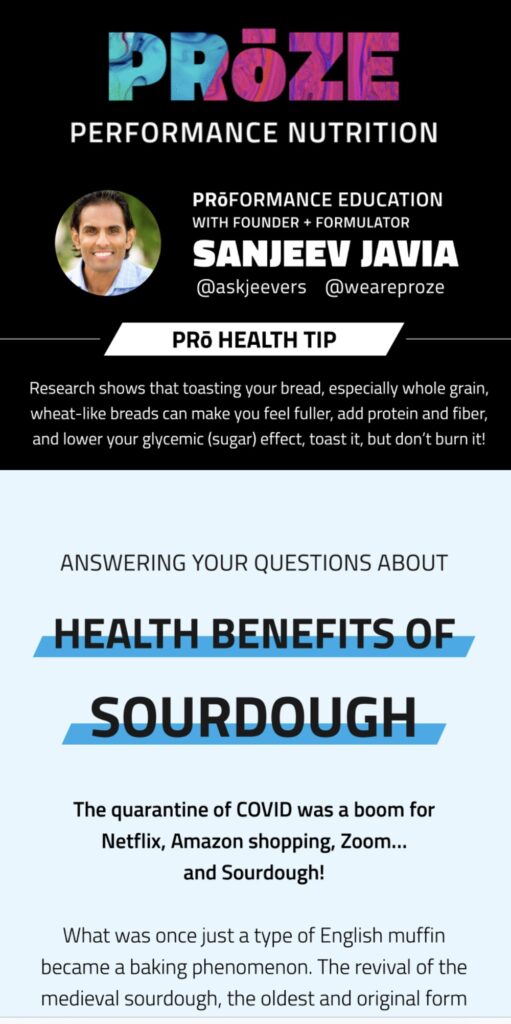Pack On That Protein!
You don’t have to be a bodybuilder to realize how incredibly important Protein is to the longevity, and most importantly to the QUALITY of your life. Think about it. Your quality of life is largely determined by what you can physically (have the strength) to do, you need your muscles (your bones don’t move by themselves), your muscles are made up of 80% protein (excluding water)..hence…NO protein, NO movement, NO quality of life.
PRō Take Aways…
- Men and Women should try to get 1g/1lb of body weight (not easy!)
- There is no one best protein source – choose your favorite
- At all times at all ages for all goals – building muscle is your answer
Q: What is protein?
A: Protein is one of the (3) macronutrients (along with Carbohydrates & Fat), each gram contains 4 calories and it can be found in almost all foods – from meat to fruits! Protein is made up of amino acids (there are 20 of them), depending on the type of protein you’re eating – beef vs. salmon, vegetable vs grain, it will have a different amino acid profile which gives you different benefits.
Q: Why do I need protein?
A: First off, it’s 80% of your muscle, so no protein, no muscle. But it’s part of every body part, tissue, and it makes enzymes to create metabolism (burns calories). Your body does make certain amino acids, but there are 9 that must come from food (essential amino acids). Lack of muscle, slow wound healing/dry skin, thin hair, brittle nails, bloating/fluid retention, are some immediate signs of not having enough protein.
Q: Where does it come from?
A: Protein is in all foods. But because protein is in muscle, it’s found in animal meat. But it can also come from vegetables and beans.
Q: Best animal-based protein sources?
A: It depends on your views of saturated fat. The best lean, or less saturated fat sources, will be Chicken, Turkey, and Fish. Ones with more saturated fat, the fat found in the muscle of animals, will be Beef, Bison, Whole Eggs. Mixing animal with vegetable sources is key because meat sources do not have any fiber, which is a critical nutrient for by-products of meat breakdown and digestion.
Q: Best plant-based protein sources?
A: Beans will be the most packed with protein per gram. Lentils, Pinto Beans, my favorite Chickpeas, and my Dad’s favorite Mung Beans. But some other great sources are Green Peas, Quinoa, and Pistachios and Almonds. Vegetable sources are often “incomplete”, meaning they do not have the full amino acid profile, therefore it’s important to eat a variety to create a more “complete” profile for yourself.
Q: How much do I need?
A: You need about 1g per 1lb of body weight. The RDA recommendation of 25% of that are ridiculous, that amount is only to survive, not thrive. Like with all the RDA values (a joke!). For male/female, for young and old, the basis should be 75-100% of your bodyweight (that # in grams). 200lbs=200g of protein.
Q: Isn’t that hard?
A: Yes, it’s a lot of protein because most of us have been eating way less. It will be an adjustment in the foods you eat, how much you spend, the way your body responds. One of my tricks is to drink protein powders, they are loaded with protein, great price, simple to make, and easy on the digestive system.
Q: Isn’t Protein inflammatory and hard on your kidneys?
A: No. Protein has never been shown to be inflammatory, what has is how you cook it (specifically meat). Overcooking and charring can cause carcinogenic compounds, burning protein is not good. But protein or meats have not shown to be inflammatory at all. As far as the kidneys, you’d have to eat 4-5x the amount (4g=1lb body weight), near impossible amounts to create kidney stress.
Q: Parting thoughts?
A: Fact is, the more lean body mass (muscle) you have the greater probability of longevity and quality of life after 50yrs old, research is clear. Protein is the driver of lean body mass. Yes, you need to workout (with weights), but even if you didn’t, you can maintain your muscle mass with protein. Sick or health, male or female, gain muscle or lose fat, I would tell them two things (1) maintain your calories and (2) get enough protein in your diet, everything else will work itself out!




